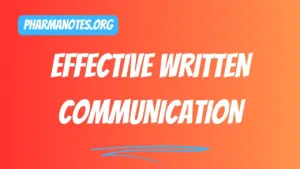Effective Written Communication

Effective Written Communication
Objective
At the end of this session, students will be able to:
• Identify the importance of written communication
• Recognize inappropriate situations for written communication
• Comprehend the needs and requirement of the reader and deliver an appropriate message
• Apply a suitable format for written communication
Introduction –Written Communication
Written communication provides a document trail for work done. It allows the reader to thoroughly understand the topic in question.
Importance-Effective Written Communication
• Writing is unique, formal, valid, reliable, precise and explicit
• Lays down principles, policies, procedures and rules
• Develops and enhances an organization’s image and reputation
• Provides ready records and references
• Legal defense depends upon written communication as it provides valid records
Examples of Effective Written Communication
Overcoming Language Barrier | Broad Casting | Record Keeping | Effective Time Management
|
Use Live Messenger instead of video conference in case understanding different dialect is a concern | Twitter, Face book, Google‘s feed can be used for broadcasting information | Emails and Reports are the best way to keep organizational records | Email, Fax, texts are effective means of conveying information |
The Least Effective Written Communication
Written communication is not effective when:
• The topic is complex
• Discussions are required
• There are different shades of meaning
Shades of Meaning
Words, with them bring different connotations when used in written text. The connotation depends on:
• Cultural backgrounds
• The ability to express emotions appropriately
In a professional context, one should be careful of the words chosen to express interest / emotions. Ambiguity needs to be avoided.
Writing Effectively – E-mails, Letters and Memos
The following information and advice relates to email or paper communication:
• Subject Lines
• Put the Main Point First
• Know your Audience
• Organization of the Message
• Subject Lines: The communication is the headline. It:
– Draws attention and informs about the topic
– Provides guidance on the course of action
– Helps recipient to prioritize
• Put main point first:
– Saves time
– Focuses on the information
– Provides clarity in the content
• Know your audience
– Identify to whom you are writing
– identify what others would gain from the information
– Decide whether it is for all, or particular identified
members of the audience
• Organization of the Message: If there are multiple calls to action in the same mail or letter, one should:
• Segregate as per the priority
• Use relevant headers: Topic – Headings, Response needed, Background, Concerns etc.
Writing Effectively – Reports
A report is a written document with the specific intention of relaying information or recounting certain events in a presentable form.
The report should contain:
• Title
• Introduction
• Body
• Conclusion
• Summary
• Recommendations
Writing Effectively – Proposals
The proposal is a formal way of putting forth an idea and asking for action to be taken on that idea.
It contains:
• Plan the proposal
• Define the audience
• Present issues /problems
• Solutions/benefits
• Deliverables
• Success Criteria
• Deadline /Plan /Approach
• Cost/Budget
Summary
Effective written communication helps the reader to comprehend, analyse and respond to it.
• Importance of effective written communication-It maintains the documents or records. It generates a formal and distinct relationship
• The most effective written communication authentic, reliable, saves time and makes the communication crystal clear
• The least effective written communication when the information is more, decision making, long explanations, conversations and controversial subjects
• Writing effectively
Subject lines
Organization of the message
Put the main point first
Know your audience
Also, Visit:
B. Pharma Notes | B. Pharma Notes | Study material Bachelor of Pharmacy pdf